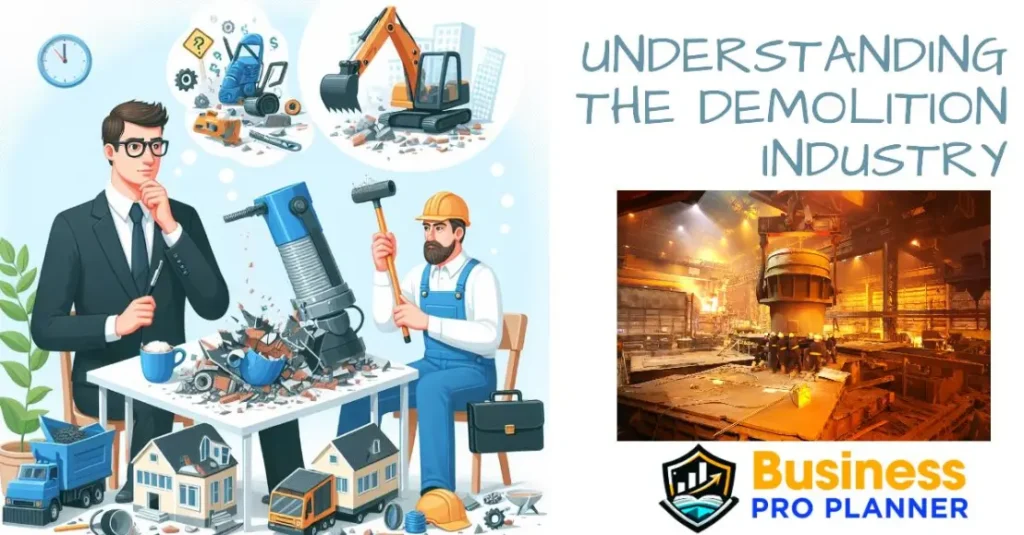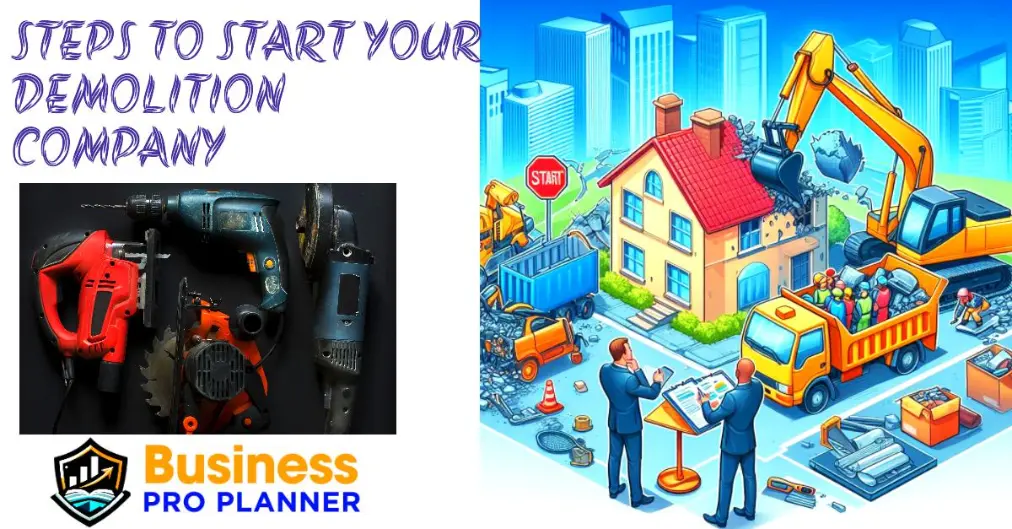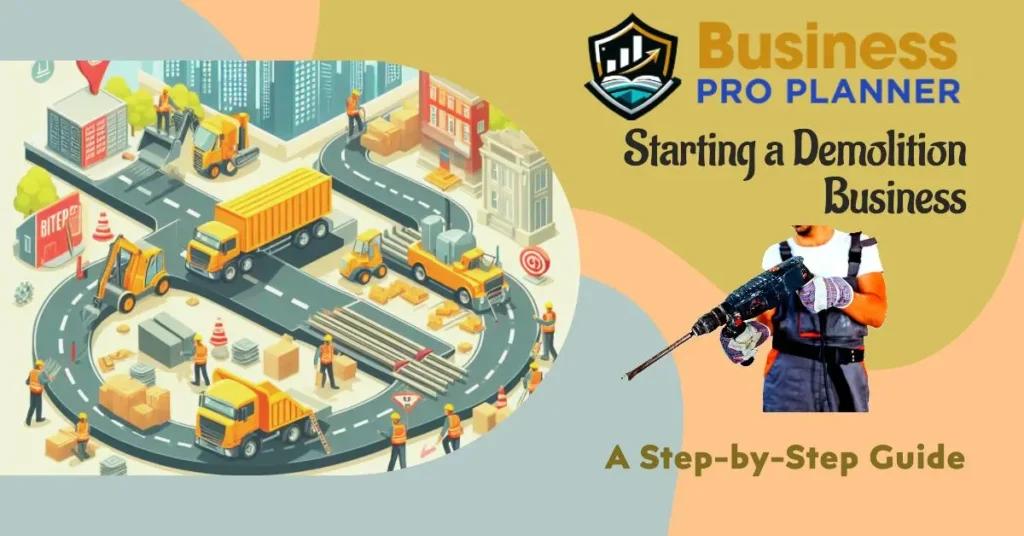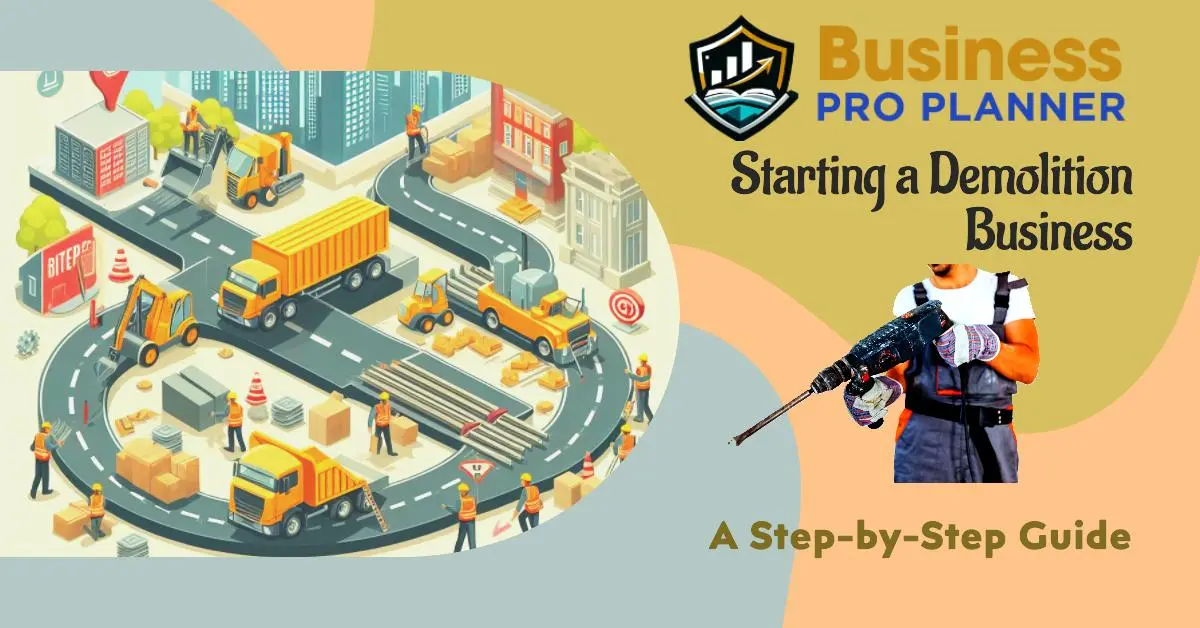The demolition industry has seen steady growth over the past decade driven by urbanization, infrastructure projects, and redevelopment of residential and commercial properties. Demolition is a physically demanding job but operating your own demolition business can be very lucrative with the steady growth in the construction industry. Do you have experience in demolition work and are looking to start your own demolition business?
Starting a demolition business requires extensive planning, capital investment, and navigating regulations, but the opportunity exists for dedicated entrepreneurs to build highly profitable enterprises in this niche. This guide will provide a comprehensive overview of the demolition sector and outline the key steps involved in starting and operating a demolition contractor business from the ground up.
Key Highlights
- Obtain necessary licenses and permits
- Create a business plan
- Choose the right business structure
- Acquire essential demolition equipment
- Implement safety protocols and training
- Obtain proper insurance coverage
- Market your services effectively
Understanding the Demolition Industry

What is a Demolition Business?
A demolition business specializes in tearing down old structures and clearing sites for new construction projects. Services include:
- Building demolition – houses, apartments, offices, retail, etc.
- Interior strip outs – removal of walls, fixtures, floors, etc.
- Industrial demolition – factories, power plants, tanks, smokestacks
- Bridge/road demolition
- Demolition due to natural disasters
- Site remediation and cleanup
Demolition contractors work closely with general contractors, developers, government agencies, and property owners.
Size and Projected Future Growth
The United States demolition industry generates annual revenues of $7 to $8 billion. Industry growth is expected to outpace the economy, driven by:
- Increased urbanization and redevelopment projects
- Aging infrastructure requiring upgrades
- Renovation of residential and commercial buildings
- Demand for greenfield sites for new construction
Growing at 3-4% annually, the industry is forecast to reach $10 billion in revenues by 2025.
Key Trends and Challenges
- Increased environmental regulations and landfill costs make demolition waste management and recycling crucial.
- Improving safety protocols and training is an industry imperative, given the risks inherent in demolition projects.
- Labor shortages for specialty trade workers like explosive demolition techs present a challenge.
- Public sector clients drive a significant share of demolition, especially infrastructure projects subject to policy changes.
- Consolidation is occurring among the largest demolition contractors. Smaller regional players must compete on specialization, flexibility, and customer service.
Types of Demolition
Demolition contractors can provide a wide range of demolition services across different sectors. The main types of demolition work include:
- Commercial Demolition: This involves demolishing offices, retail stores, hotels, restaurants, and other commercial buildings to make way for new construction. It requires expertise in bringing down large structures safely.
- Industrial Demolition: Industrial projects range from decommissioning factories, power plants, and refineries to removing storage tanks, smokestacks, and silos. Strict regulations govern the demolition of sites containing hazardous materials.
- Residential Demolition: Residential demolition entails tearing down houses, apartment buildings, garages, swimming pools, and other residential structures. This field has lower barriers to entry for small contractors.
- Interior Demolition: Also known as strip-outs or soft demolition, this work includes selective removal of walls, flooring, fixtures, roofing, and other non-structural components. It’s needed for renovations and adaptive reuse projects.
- Bridge and Road Demolition: Demolishing bridges, overpasses, highways, tunnels, and other infrastructure requires specialized techniques like incremental launching. Strict traffic control is necessary.
- Emergency Demolition: This unscheduled demolition work is needed after natural disasters, fires, accidents, or other emergencies render structures unstable. It must be performed quickly and safely.
- Mechanical Demolition: This precision demolition uses robotic equipment like high-reach excavators and attachments for projects with restricted access or requirements to minimize vibration, noise, and dust.
Offering a diverse range of demolition services allows contractors to bid on broader scopes of work. The experience gained in each area builds overall capabilities.
Pros and Cons of the Demolition Business
Pros:
- Steady demand for demolition services across sectors
- Higher profit margins compared to construction work
- Jobs range from small single-family homes to large commercial demolition projects
- Requirements for specialty equipment and expertise create barriers against new entrants
Cons:
- Highly capital-intensive requires an array of costly equipment
- Significantly greater risks to life and property than in other construction fields
- High insurance costs and industry regulation create overhead expenses
- Work volume fluctuates with the economy and construction activity
Estimated Startup Costs
Starting a demolition firm requires $150,000 to $300,000 to cover:
- Licenses, permits, insurance – $50,000 to $100,000
- Used equipment purchases – $75,000 to $150,000
- Working capital for 3-6 months until revenue from jobs is steady
Financing options include small business loans and lines of credit, equipment financing, and partnerships with investors.
Steps to Start Your Demolition Company

Develop a Strong Business Plan
The first step to launching any business is crafting a comprehensive business plan. This document will serve as the blueprint for your demolition company and should cover:
Financial Projections
- Estimated start-up costs
- Projected overhead and operating expenses
- Anticipated demolition job costs and projected revenues
- Profit and loss projections
- Funding requirements
Company Description
- Your company’s proposed services
- Target customers and market positioning
- Geographic service areas
- Long-term business goals
Marketing Plan
- Branding strategy
- Promotions plan
- Competitor analysis
- Pricing structure
Choose a Business Structure
You’ll need to determine the legal structure under which your demolition business will operate. Common options include:
Sole Proprietorship
- Easy and inexpensive to form
- The owner has complete control and retains all profits
- No legal separation between business and owner
- Owner has unlimited personal liability
Partnership
- Shared ownership between partners
- Profits are passed through to partners and taxed personally
- Parties have joint and several liability
Limited Liability Company (LLC)
- Hybrid structure with corporate and partnership features
- Owners have limited personal liability
- Profits pass through and are taxed personally
- More credibility with customers than sole proprietorship
Corporation
- Most complex and expensive to form
- Business is a distinct legal entity from owners
- Owners have limited liability
- Profits taxed at a corporate level and personally
Obtain Necessary Licenses and Permits
Demolition businesses are highly regulated and require:
- General Business License: Required by state/local governments to operate any business
- State Contractor’s License: Needed for structural demolition work
- Demolition Permits: Securing a permit is required before demolishing any building
- Waste Permits: For transporting and disposing of hazardous waste
- Stormwater Permits: To discharge stormwater from demolition sites into sewers or waterways
- Air Quality Permits: For demolishing structures containing asbestos
Acquire Essential Demolition Equipment
Demolition is a capital-intensive endeavor. Some key equipment you will need:
- Excavators
- Loaders
- Bulldozers
- Dump trucks
- Compact track loaders
- Hammer attachments
- Shears
- Pulverizers
- Handheld power tools
For starting small, look into renting or leasing equipment to minimize initial costs. As your business grows, invest in owned equipment. Maintain a mix of light equipment along with heavy machinery.
Implement Rigorous Safety Protocols
Demolition sites contain numerous hazards. Develop detailed safety policies and procedures, including:
- Site Evaluation: Inspect for risks like asbestos, lead, mold, structural instability, underground tanks, and utilities.
- Hazard Control: Use engineering controls like barricades, netting, scaffolding, and dust suppression. Provide PPE.
- Emergency Planning: Create evacuation plans. Ensure access to first aid and fire suppression equipment.
- Training: Provide extensive training on equipment usage, hazardous materials, evacuation protocols, PPE use, and more.
A strong safety program is crucial for protecting workers, avoiding OSHA violations, and minimizing liability risks.
Obtain Proper Insurance Coverage
Carry adequate insurance policies to safeguard your business:
- General liability Insurance: Protects against property damage and bodily injury claims. Limits of $1-2 million are recommended.
- Worker’s Compensation: Mandatory for businesses with employees. Provides wage replacement and medical benefits for job-related injuries.
- Business Property Insurance: Covers company-owned equipment in the event of theft, damage, or loss.
- Commercial Auto: For company-owned vehicles.
Pricing and Finances
- Bid competitively while covering your costs and allowing a 20-30% profit margin.
- Benchmark against competitors’ rates in your region. Adjust for project-specific risks and equipment needs.
- Bill client’s progress payments during longer demolition jobs for improved cash flow.
- Carefully manage equipment costs, insurance, and payroll to maximize profitability.
Safety and Compliance
- Provide extensive training to employees focused on equipment operation, site hazards, and materials handling.
- Require and enforce proper use of PPE – hard hats, boots, gloves, eye protection, and dust masks.
- Implement engineering controls like netting, barricades, and signage to secure job sites.
- Adhere strictly to all regulations related to waste disposal, stormwater management, asbestos handling, and air quality.
Market Your Demolition Services
Promote your business through:
- Bid requests with general contractors, developers, and government agencies
- Website and social media presence highlighting your services
- Networking with local builders, architects, engineers, real estate agents
- Print ads in construction industry publications
- Signage and vehicle wraps displaying your brand
Focus on developing long-term relationships and delivering prompt, high-quality demolitions. Ask clients for testimonials and referrals to build your reputation.
Start Small and Grow Over Time
When launching a demolition company, begin with manageable jobs to establish your business. Target:
- Residential demolition
- Interior demolition
- Small commercial projects
- Hand demolition tasks on bigger projects
Line up projects in advance so you have work booked. Invest profits into additional equipment and labor as your experience grows. Consider expanding into related services like asbestos abatement or remediation.

Conclusion
By following this guide and gaining hands-on experience, an aspiring contractor can build a highly successful demolition business. Make safety your number one priority, invest wisely in equipment, and continually expand your skillset. The demolition field offers tremendous opportunities for the enterprising entrepreneur. With proper planning, perseverance, and excellent execution, a demolition company can become a thriving enterprise.
Muhammad Asif Saeed has extensive experience in commerce and finance. Specifically, He holds a Bachelor of Commerce degree specializing in Accounts and Finance and an MBA focusing on Marketing. These qualifications underpin his understanding of business dynamics and financial strategies.
With an impressive 20-year career in Pakistan’s textile sector, including roles at Masood Textile (MTM) and Sadaqat Limited, excelling in business & financial management. His expertise in financial and business management is further evidenced by his authoritative articles on complex finance and business operation topics for various renowned websites including businessproplanner.com,businesprotips.com,distinctionbetween.com, trueqube.com, and bruitly.com, demonstrating his comprehensive knowledge and professional expertise in the field.

